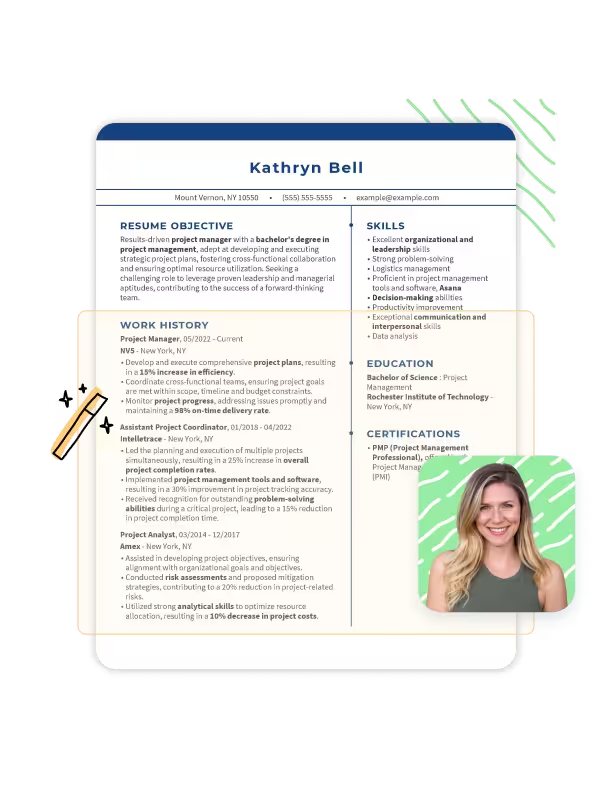Table of contents
A truly impressive resume isn't always enough to get noticed by employers. Your qualifications might be perfect for the role, but does your resume emphasize the right keywords to show employers and applicant tracking systems (ATS) that you have what it takes?
Sometimes, the thing that makes or breaks a resume is the use of resume keywords. Our guide will walk you through how resume keywords work and how to adapt and build a resume with keywords that get you noticed.
Our guide covers:
- What resume keywords are.
- What ATS is and how to pass ATS screening.
- How to use resume keywords on your resume.
- A resume example that makes the most of keywords.
Need help building or updating your resume? Try our AI Resume Builder for help getting started. This tool handles the formatting for you and provides fully customizable text suggestions to help you beat that pesky writer's block.
Related Guides & Tips
Browse other popular samples
What Are Resume Keywords?
Resume keywords are words or phrases that employers will be looking for on your resume. Too broad of a definition? Let's walk through an example to understand how resume keywords work and how to use them to pass through ATS screening.
Say you're a manager at a restaurant, and you're hoping to hire a new line cook with at least two years of experience in the kitchen. Your restaurant serves primarily Italian cuisine, so your ideal candidate is someone with experience making pasta. You also had a bad experience with a past line cook who would lash out at his co-workers when tickets would pile up during the dinner rush. You might write a job ad like this:
Sample job ad with resume keywords:
Position: Line Cook for Bellisimo Bistro
Responsibilities:
- Prepare and cook a variety of Italian dishes, with a focus on pasta.
- Collaborate with the kitchen team to streamline operations during peak hours.
Requirements:
- Minimum of two years of experience as a line cook with a strong background in Italian cuisine.
- Proficient in pasta preparation and cooking techniques.
- Ability to handle a fast-paced kitchen environment.
Now, when you start receiving resumes that look intriguing, you might be annoyed to get to the bottom and realize that the candidate is missing the experience you were hoping for. So, instead of wasting any more time, you employ ATS to filter out resumes that lack the following key phrases:
- Two years of experience
- Line cook
- Italian cuisine
- Collaborate
- Fast-paced kitchen
- Pasta
These are the keywords that a successful candidate should use on their resume if they want to land this role. Notice that these keywords include both hard and soft skills.
Using ATS helps you avoid wasting time, but it also means that you might miss out on an experienced candidate because they used the phrase "fast-paced work environment" instead of "fast-paced kitchen."
This is an extreme example, but it illustrates why it's important to be specific with the keywords you choose for your resume. Look for phrases from the job listing that you can incorporate and try to be exact in your word choice when it comes to the most important phrases.
What Is ATS and How Can I Make a Resume That Passes ATS?
With hundreds of applications to sift through, it's common for employers to outsource part of the job to computer software. Applicant tracking systems (ATS) are designed to filter resumes based on the presence of certain keywords that indicate whether a candidate is qualified.
Resume keywords can be so specific that qualified candidates are lost in the shuffle without ever reaching human eyes. To avoid this fate, as a modern job seeker, you must adapt and learn how to use ATS to your advantage. This is where resume keywords come in.
ATS is not the only reason to use resume keywords. Matching your resume to the expectations of the hiring team is a great way to get noticed even when ATS isn't a part of the process. But these days, it's safest to err on the side of assuming that ATS is involved.
But what actually is an ATS? Applicant tracking systems work by searching through resumes for preset keywords. Employers tell the ATS what they want to see on a resume, and the ATS filters through the applicants to find the ones that match.
An ATS screening process may filter for:
- Specific resume skills.
- Experience level.
- Education.
- Other core competencies and qualifications that the employer would like the ideal candidate to have.
This is why learning how to write a resume that incorporates keywords is so important.
An ATS-friendly resume will help you get your resume into the right hands. Passing through ATS might seem intimidating, but the job listing has already provided you with the tools you need. If the ATS screening process is mysterious, unknown territory, the job listing is a treasure map with landmarks leading you to your destination.
Follow the keywords provided in the job listing, and they'll lead you to a resume that not only passes ATS but also incorporates the terms you already know the hiring team hopes to see.
We often think of ATS as filtering for specific industry terms or qualifications. This is one of ATS's functions, but you might be surprised to learn that many employers screen for soft skills, too. Make sure to build a robust and balanced resume to pass ATS and prove you're the right candidate.
How to Use Keywords on a Resume
You might be wondering, now that I know that keywords are important, how do I know which keywords to use on my resume? Let's review how to use resume keywords to ace the ATS screening and impress employers.
Step one is to read the job listing carefully. Let's use an example job listing to demonstrate:
Example job listing with keywords:
Position: Marketing Copywriter for Simply Software Inc.
Responsibilities:
- Create compelling and original copy for various marketing materials, including website content, blog posts, social media and more.
- Utilize WordPress to update and maintain website content.
- Implement SEO strategies to drive organic web traffic and improve search engine rankings.
- Collaborate with cross-functional teams, including marketing, design and development, to ensure cohesive messaging.
- Manage and meet deadlines for multiple projects simultaneously.
Requirements:
- Proven experience as a copywriter with a strong portfolio showcasing diverse writing samples.
- Proficiency in using WordPress for content management.
- Knowledge of SEO best practices to optimize content for search engines.
- Excellent communication and collaboration skills to work effectively with cross-functional teams.
- Ability to thrive in a fast-paced environment and meet tight deadlines.
It might be tempting to look at a job listing like this and try to squish every single word onto your resume, but choosing the right keywords is an important skill. Look at each section and pay attention to the words that stand out as important.
Take this sentence as an example:
- Knowledge of SEO best practices to optimize content for search engines
Is the word "knowledge" the important part here? Nope! There are obvious phrases that stand out as more likely keywords. Phrases like "SEO" and "optimization" come to mind as potential keywords a candidate could use to apply for this role.
Notice how some phrases come up in the job listing more than once? "SEO," "search engines" and "WordPress" all appear multiple times. That's a valuable clue that these phrases are keywords worth paying attention to.
Including resume keywords in your skills and experience section is an obvious way to optimize your resume for ATS, but if you want to create a resume that shows how perfectly you align with the role, look at all the other parts of your resume as potential opportunities for keywords. Opening with a resume profile that's rich in keywords will help you grab attention from the beginning.
Example Resume Using Keywords From a Job Listing
Now that we've gone over how to find keywords in a job listing, let's look at an example resume that uses keywords to maximize the candidate's chances of success. This job listing is rich with project management keywords that our candidate can use as a guide for writing a resume that aligns their experience with the role.
Seeking innovative project manager for role at growing consulting firm
Responsibilities:
- Develop and execute project plans, including scope, timeline, budget and resource allocation to maximize efficiency.
- Coordinate and collaborate with cross-functional teams to ensure project goals are met.
- Monitor project progress and address any issues that may arise.
- Manage project budgets, ensuring cost-effectiveness and resource optimization.
- Communicate regularly with stakeholders to provide updates on project status and address concerns.
- Identify and mitigate risks to ensure successful project delivery.
- Foster a positive team environment and lead by example in terms of professionalism and accountability.
Qualifications:
- Bachelor's degree in a relevant field (Project Management, Business, Engineering, etc.).
- Proven experience as a project manager in a similar industry.
- Excellent organizational and leadership skills.
- Strong problem-solving and decision-making abilities.
- Exceptional communication and interpersonal skills.
- Proficient in project management tools and software, particularly Asana.
- PMP or PRINCE2 certification is a plus.
Notice how some of the bolded words and phrases are pulled directly from the job listing? This candidate is poised for success because of her strategic use of keywords. Not only is this resume likely to pass through ATS with ease, but doesn't it just sound perfect for the role? If you were looking to hire a project manager, wouldn't you want to hire a candidate who matched your job listing like this?
It's also important to note that not every keyword is an exact match. Important industry terms match closely, but this resume still uses its own words to convey the candidate's experience.
Keywords aren't the only aspect of this resume that grabs attention. The use of numerical data allows the reader to visualize the real-world impact of this candidate's experience. This is an important tool to help get your resume noticed.
How to Use Keywords to Level Up Your Cover Letter
A great resume is crucial to landing an interview, but it isn't the only thing you need for a job application that gets noticed. A cover letter is an important step that a lot of candidates neglect.
And if you think we're done talking about the value of keywords, think again! Cover letter keywords work the same way that resume keywords do. Your cover letter is an extra opportunity to really lean into why you're the perfect fit for the role. Naturally, including details from the job listing is an important step toward accomplishing this.
If writing a cover letter seems challenging, don't do it alone! Let our Cover Letter Builder simplify the process for you with formatting help and expert guidance to help you complete a polished letter that shows off your professional skills.
Key Takeaways
-
Check the job listing for clues.
Writing a resume doesn't have to be a guessing game! Treat the job listing as a map that can guide you toward a resume that positions you as the exact right candidate for the job. Look for key phrases from the job listing that describe the skills and experience that the ideal candidate will have.
-
Ace the ATS.
Needing to impress a robot before your resume reaches a real person is frustrating. But, learning how to get through the ATS process can be a big help. Use keywords strategically to ensure that a human decides whether you'd be a good fit.
-
Match your word choice.
Because of how ATS works, it helps to match your word choice to the exact wording from the job listing. Don't quote whole sections of the listing, but make sure the words you use to describe key skills match the word choice that the employer uses.
-
Focus on the important words.
Not every phrase from the job listing qualifies as a resume keyword. Pay special attention to the sections that describe the ideal candidate's skills, experience and responsibilities. You don't need to incorporate filler text, but the words used for the qualifications can be valuable keywords. All it takes is a bit of critical thinking.
Resources to Help With Your Job Search
- 21st Century Skills for Your Resume
- Networking Skills for Your Resume
- How to Use AI for Your CV
- The Perfect Resume: A Detailed Guide for 2024 (+Examples)
- How to Write a CV: The Complete Guide for 2025
- How to List References for a Resume With No Experience
- How to Update Your Resume in 2024 (Guide + Expert Tips)
- How to Prepare for a Job Interview
Was this information helpful? Let us know!
Hailey Brophy is an experienced writer with a diverse career in digital publication. She is passionate about using her unique skills and experiences to help job seekers find the information that they need to succeed.
More resources

Hobbies and Interests to Put on Your Resume: Examples & Guide
Showcase individuality and drive by putting hobbies and intere...

How to List Relevant Coursework on a Resume (With Examples)
Wondering how to list relevant coursework on a resume to show ...

Biotechnologist: Examples, Templates & Tips for 2025
Dreaming of becoming a biotechnologist? Check out our easy-to-...

Construction Manager Resume: Examples, Templates & Tips for 2025
Set the foundation for a successful 2024 in your construction ...

Business Process Analyst Resume: Examples, Templates & Tips for 2025
Looking for a job as a business process analyst? Find the perf...


